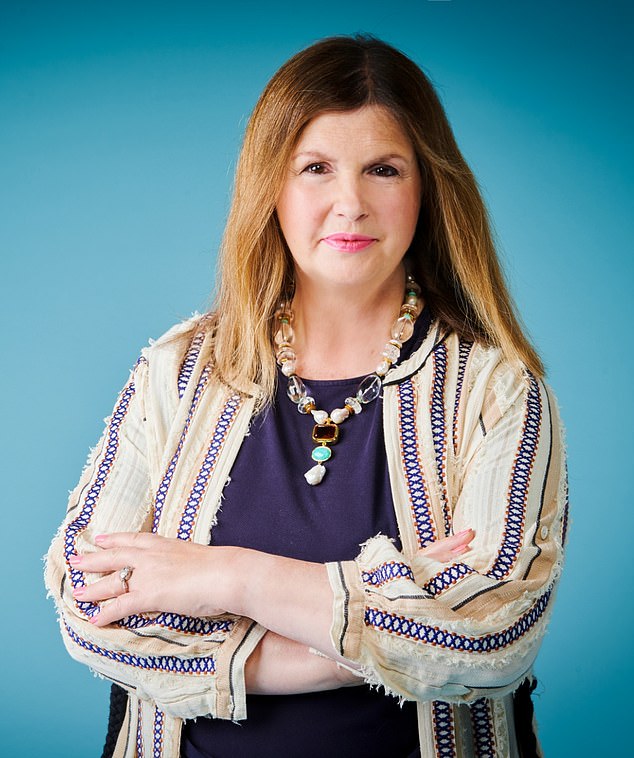NICOLA HORLICK: How do I tell my male boss to stop calling me sweetheart?
Today’s working life is full of ever-evolving challenges and pitfalls. When is it okay to date a coworker? Can you tell your team to return to the office five days a week? Whether you’re a bewildered Boomer, a confused Millennial or a confused Gen Zer, our brilliant columnist Nicola Horlick (asknicola@mailonsunday.co.uk) is here to help. She uses her experience in business to guide you through the pitfalls and put you on the path to success.
I am a 25 year old college graduate who recently started working at a leading professional services company. I love my job, but one thing upsets me. My direct line manager swears a lot, and also uses some words that I find offensive.
He doesn’t curse at people or insult anyone. He just peppers his conversation with profanity. He’s probably in his 50s and calls me “sweetheart” and calls women “babes” or “chicks,” but he brings in a lot of business and is very popular with important clients. An older woman suggested that he control his language, but he ignored it.
I’m not a woke snowflake, but I find this uncomfortable. Should I say something to him, or maybe even go to HR?
– Emma
Nicola replies: I’m not surprised that you find your manager’s language offensive. And it is unacceptable for him to call a colleague “honey” or “sweetie” or refer to them as “chicks”, so I think you should go to the human resources team.
Your line manager’s boss should have noticed his language and it is worrying that this continues. This is about the culture of the company. A supportive work environment can only be created if the people who manage it instill the right values. If your line manager’s boss hasn’t noticed his language or the discomfort his attitude towards women is causing, something is wrong.
I hope the HR manager can help you, even though everyone is terrified that your line manager will take offense and leave. Such behavior should never be taken into account just because someone generates substantial revenue and is popular with customers.
If nothing happens, you can tell your ultimate boss that you are dissatisfied with the culture. It is important that young women are treated with respect and have positive role models in the workplace. In my first job there was such a woman who was wonderful.
She was extremely professional and no male colleague would dare speak to her in a ridiculous or misogynistic manner. She inspired total respect and from watching her I learned that it was possible as a young woman to earn the respect of colleagues by being the best and most professional I could be in the office.
There were occasional problems – a hand accidentally brushing my buttocks as I bent down to get something from a file or a hand on my knee during lunch – but overall my male colleagues knew not to deal with could mess with me. If you’ve spoken to HR and your concern still hasn’t been taken seriously, it may be time to move on. There is plenty of demand from other employers for smart young women like you.
Can you tell me how I can compliment a member of my team on her outfit without being accused of harassment or favoritism?
I am a 48-year-old man in a creative industry where it is important that our people have the right appearance when they go out to clients. I don’t want to impose a dress code. But I do want to get rid of the idea that someone has the elegant yet edgy vibe we need to give off – without her thinking I’m some middle-aged pervert coming up to her.
– Jake

I don’t think it’s appropriate for you to comment on your female team member’s clothing, advises Nicola Horlick
Nicola replies: That’s a tough one. I don’t think it’s appropriate for you to comment on your female team member’s clothing. If you’re trying to encourage a certain look, you might want to discuss it with the whole team. You could say that your colleague has the ‘vibe’ that you want to create.
But when you do this, you’re essentially imposing a dress code, so it might be better to leave it up to people to decide for themselves what the right atmosphere is. Because so many people are now working at least partially from home and meeting online, clothing seems to be less of an issue. Even in financial services, clothing has changed dramatically.
When I joined a bank in the 1980s, women wore power suits with huge shoulder pads and heels, and no pants were allowed. Today, young women in the financial world wear pants and shirts, even ditching the jacket.
I prefer a team that can express itself. Why should you be the arbiter of what is ‘elegant but sharp’? The best teams are teams with an element of diversity.
Diversity in the true sense of the word means people with different backgrounds and different life experiences. This should be reflected in the way they dress.
So leave it to the team – and definitely don’t comment on your female colleague’s outfit.
asknicola@mailonsunday.co.uk
